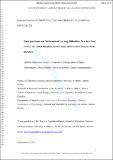Files in this item
Hand preference and mathematical learning difficulties: New data from Greece, the United Kingdom, and Germany and two meta-analyses of the literature
Item metadata
| dc.contributor.author | Papadatou-Pastou, Marietta | |
| dc.contributor.author | Panagiotidou, Despoina-Athanasia | |
| dc.contributor.author | Abbondanza, Filippo | |
| dc.contributor.author | Fischer, Ursula | |
| dc.contributor.author | Paracchini, Silvia | |
| dc.contributor.author | Karagiannakis, Giannis | |
| dc.date.accessioned | 2022-04-05T23:43:37Z | |
| dc.date.available | 2022-04-05T23:43:37Z | |
| dc.date.issued | 2021 | |
| dc.identifier | 273685049 | |
| dc.identifier | ad8f0e69-aa02-4ae4-ab3d-758e4ab651d0 | |
| dc.identifier | 85103887613 | |
| dc.identifier | 000637260100001 | |
| dc.identifier.citation | Papadatou-Pastou , M , Panagiotidou , D-A , Abbondanza , F , Fischer , U , Paracchini , S & Karagiannakis , G 2021 , ' Hand preference and mathematical learning difficulties: New data from Greece, the United Kingdom, and Germany and two meta-analyses of the literature ' , Laterality , vol. Latest Articles . https://doi.org/10.1080/1357650X.2021.1906693 | en |
| dc.identifier.issn | 1357-650X | |
| dc.identifier.other | ORCID: /0000-0001-9934-8602/work/92020398 | |
| dc.identifier.uri | https://hdl.handle.net/10023/25145 | |
| dc.description | SP and FA are funded by the Royal Society. The UK Medical Research Council and Wellcome Trust (Grant ref: 217065/Z/19/Z) and the University of Bristol provide core support for ALSPAC. This publication is the work of the authors and Silvia Paracchini will serve as guarantors for the reporting of the ALSPAC analysis in this paper. A comprehensive list of grants funding is available on the ALSPAC website (http://www.bristol.ac.uk/alspac/external/documents/grant-acknowledgements.pdf). | en |
| dc.description.abstract | Increased rates of atypical handedness are observed in neurotypical individuals who are low-performing in mathematical tasks as well as in individuals with special educational needs, such as dyslexia. This is the first investigation of handedness in individuals with Mathematical Learning Difficulties (MLD). We report three new studies (N = 134; N = 1,893; N = 153) and two sets of meta-analyses (22 studies; N = 3,667). No difference in atypical hand preference between MLD and Typically Achieving (TA) individuals was found when handedness was assessed with self-report questionnaires, but weak evidence of a difference was found when writing hand was the handedness criterion in Study 1 (p = .049). Similarly, when combining data meta-analytically, no hand preference differences were detected. We suggest that: (i) potential handedness effects require larger samples, (ii) direction of hand preference is not a sensitive enough measure of handedness in this context, or that (iii) increased rates of atypical hand preference are not associated with MLD. The latter scenario would suggest that handedness is specifically linked to language-related conditions rather than conditions related to cognitive abilities at large. Future studies need to consider hand skill and degree of hand preference in MLD. | |
| dc.format.extent | 54 | |
| dc.format.extent | 1731939 | |
| dc.language.iso | eng | |
| dc.relation.ispartof | Laterality | en |
| dc.subject | ALSPAC | en |
| dc.subject | Meta-analysis | en |
| dc.subject | Handedness | en |
| dc.subject | Mathematical abilities | en |
| dc.subject | PC mouse preference | en |
| dc.subject | QP Physiology | en |
| dc.subject | RC0321 Neuroscience. Biological psychiatry. Neuropsychiatry | en |
| dc.subject | DAS | en |
| dc.subject.lcc | QP | en |
| dc.subject.lcc | RC0321 | en |
| dc.title | Hand preference and mathematical learning difficulties: New data from Greece, the United Kingdom, and Germany and two meta-analyses of the literature | en |
| dc.type | Journal article | en |
| dc.contributor.institution | University of St Andrews. School of Medicine | en |
| dc.contributor.institution | University of St Andrews. Centre for Biophotonics | en |
| dc.contributor.institution | University of St Andrews. Biomedical Sciences Research Complex | en |
| dc.contributor.institution | University of St Andrews. Cellular Medicine Division | en |
| dc.contributor.institution | University of St Andrews. St Andrews Bioinformatics Unit | en |
| dc.identifier.doi | 10.1080/1357650X.2021.1906693 | |
| dc.description.status | Peer reviewed | en |
| dc.date.embargoedUntil | 2022-04-06 | |
| dc.identifier.url | https://osf.io/wqf7j/ | en |
This item appears in the following Collection(s)
Items in the St Andrews Research Repository are protected by copyright, with all rights reserved, unless otherwise indicated.

